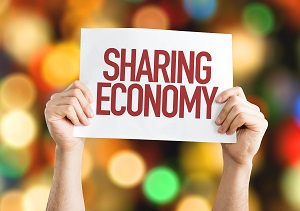
Why Airbnb is winning the war
Doug Kennedy, president of the Kennedy Training Network, is one of the most respected advisors on anything hospitality. Last month, in accomnews, he raised a few eyebrows by booking an Airbnb stay.
As Kennedy put it, “With my career as a hotel trainer providing so many connections, and with my wife being a 25-year employee of a major hotel brand, we usually stay at a hotel either where we know someone or at least where she can get an employee rate.”
So why risk an Airbnb experience?
“As part of the sharing economy, Airbnb is often called a disrupter of the traditional room accommodations model. Based on my experience, perhaps the hotel industry could benefit from this disruption by improving its own service experiences,” Kennedy explained. “First, I visited the websites of a few of the hotels I had found by doing a search on an online travel agency website. I then clicked over to TripAdvisor to check out some reviews. Not being satisfied with what I was finding, I decided to visit Airbnb. Right away I began to realise why this channel has become so popular.”
What Kennedy found was similar to what many have discovered.
“First, it was much more informative than most hotel websites. I found a terrific mapping feature, easy access to verifiable guest reviews and, best of all, most of the properties had lots of real-world pictures, not just stylised professional shots. I decided to email some questions to a few of the hoteliers and also to the owner/host of the Airbnb unit. This was when I first began to notice what I liked most about the experience: the authentic, genuine hospitality delivered personally by the Airbnb host.
“I sent all of my emails at the same time. There were four messages to traditional hoteliers and one to my Airbnb host, including a few questions about transportation, shopping and dining. Out of the four hotelier inquiries:
1. one never responded to my questions;
2. another simply quoted the rates and completely ignored my other questions;
3. the third replied with brief, one-line answers; and
4. the fourth replied with pleasantries and more detailed answers—but it took four days!
“Meantime, my Airbnb inquiry was answered within hours by host Nicole. Thanks to the platform’s easy-to-use app, I received the response there as well as via text. She provided thorough details about the transportation options and volunteered additional details about how the accommodation would be perfect for us as there was a small yard in the front of the home where we could enjoy what was likely to be nice, early fall weather.
“In the ensuing weeks before our arrival, we exchanged a few more messages. Nicole continued to extend personalised hospitality to us, always responding promptly. That first impression of the Airbnb experience and Nicole was good, but it was the arrival experience that left the biggest impression.
“On the morning of our arrival, I received a text from Nicole asking how our flight had been and reconfirming our arrival time. When we got to the apartment, she was there to greet us personally, taking time to walk us through the accommodation and to answer questions we had about the local area. She messaged us during the stay to make sure everything was going well. We had to depart in the early morning at the end of our stay, so Nicole sent her regrets at not being able to say goodbye in person and wished us a fond farewell.”
While Kennedy’s comments were interesting, the blogs that followed were even more so!
“I have just been to the USA and Canada and stayed in Airbnb for the first time – never again. At least with accredited accommodation you know what you are getting. I never received the treatment that Doug experienced – in fact – I experienced the opposite. The host didn’t care one iota about me – only in it for the money. The places were filthy and the bed linen was barely clean. The towels were ripped and the cooking utensils were scarce. No instructions were left as to how things worked either,” wrote one respondent.
“It is more than likely that Airbnb is here to stay and like any new idea or competitor something positive can be learnt from them. Many in the service industry in Australia could learn something from the service that Doug received,” commented another.
But another really said it all: “Did you not take in key points regarding the service that that gentleman had from his very first question. If we are to compete with Airbnb we should understand that there is a growing market of people out there that are not just looking for the clean crisp standard sheets with some colourful runner on the bed and the same number of coat hangers facing the same way…
They are wanting the human connection. To be treated as an individual. I do not understand why you would downplay the amateur reviews when we ourselves are being ‘reviewed by amateurs’ on TripAdvisor etc… Those people’s opinion are the most important. He has raised some valid points that if you have not stopped and thought – wow I could do that better then you are ignoring what is happening – why a lot of people are trying out Airbnb.”
The Wall Street Journal reports Airbnb made US$340 million in revenue in the third quarter. Gross bookings were $2.2 billion while room nights grew 110 percent to 23.8 million.
On top of this, Airbnb has just confirmed it has raised $1.5 billion in new funding for its on-demand accommodation platform. What the company will do with the new investment is anyone’s guess but chances are that it’ll be used to fight off regulators and help its community of hosts establish home-sharing clubs.
Just six weeks ago, Airbnb held its third annual host conference, Airbnb Open 2015 in Paris. Over 5000 Airbnb hosts and 600 Airbnb staff from 110 countries (of the two-plus million homes currently available to rent) ventured to the city to learn about the company’s new suites of features designed to eliminate frictions in the travel booking and planning process.
An Australian delegate at that event told Resort News, “We spoke with Airbnb’s head of product, Joe Zadeh, to learn more about the value in human connection, utilising connected technologies to deliver rich and frictionless experiences and empowering hosts to be an educational tool and concierge service for their guests.”
If Kennedy’s experience is anything to go by, Zadeh’s message is getting through.
Morgan Stanley Global Insight analyst Brian Nowak notes that Airbnb traveller penetration is already at 12 percent and the team projects penetration to hit 16-18 percent within a year or so. The MS survey suggests that 12 percent of leisure and business travellers have used it at least once, with penetration expected to increase over the next 12 months (18 percent for leisure and 16 percent for business).
So it is not going to go away any time soon. New research commissioned by peer-to-peer lender RateSetter reveals 52 percent of Australians trust a sharing economy service more than its traditional alternative. The RateSetter Sharing Economy Trust Index released in December shows 61 percent of Australians have used a sharing economy service – such as Uber or Airbnb – in the previous six months and 85 percent intend to use one in the next year.
A quarter of Australians say they feel more confident about using the sharing economy compared to the same time last year.
As an example of Australian acceptance, Tourism Victoria is getting into bed with Airbnb, as the online app’s money-minting hosts claim they are out-competing five-star hotels. The government’s official tourism agency is working with Airbnb to promote Melbourne’s middle and outer suburbs, such as Fitzroy and St Kilda, in an effort to encourage tourism to non-traditional areas.
The new partnership will see Tourism Victoria and Airbnb work together on several step-out websites to promote Melbourne’s outer-Metro suburbs. Tourism Victoria will also push visitors to its site towards Airbnb.
According to Airbnb’s own figures, users are earning an average of $7100 a year in St Kilda, with most users booking out their rooms for between 30 and 60 days a year.
Larry Mogelonsky, another highly respected hotel expert and regular contributor to Resort News paints another perspective: “Airbnb (and other companies with similar non-traditional modus operandi) now pose perhaps the single greatest threat to the hospitality industry. From quaint beginnings as a website mainly for couch-surfers and backpackers, the company has emerged in the past few years to offer accommodations that rival every hotel in the world. They still have plenty of products targeting the low-end, but they also have ultra-luxury houses and condominium units available for booking as well as an impressive corporate travel program.
“Think of what you go through to set-up and sustain your commercial enterprise: occupancy permits, employee background checks, health inspections, fire alarm testing and so on. Airbnb has almost none of that, serving to disrupt an established system that not only protects the consumer from harm but also employs a lot of people across multiple fields in the process.
“Next, consider what your city is losing in destination tax levies as well as state and property taxes. Think about how all that money cycles back through the local economy in the form of infrastructural upgrades, urban renewal, capital for new attractions and support for tourism bureaux. In the short run, endorsing Airbnb may translate into heightened travel to a region due to increased room supply, but thinking long-term (years or decades from now), without large-scale periodic upgrades shepherded forward by governmental institutions, a municipality’s incoming traveller numbers may go into decline,” Mogelonsky warns.
But he adds, “Moreover, have you tried Airbnb? It’s actually pretty great! The website and app work flawlessly and they have some truly remarkable rooms available.
There’s a reason why it’s passed the billion-dollar valuation mark within the first decade of its existence and it’s because it gives customers what they want. Try it for yourself to see. And rather than wait for external actions to correct the issue, you best treat this company as a legitimate, bona-fide competitor to your business.”
Every time the world is going to change, managers call for statutory regulations to secure their own status. Airbnb should not be seen as a threat, but as a new player on the market. The sharing economy will not disappear with more regulations. Not every guest will leave and not everybody wants to stay in a private apartment or room. Airbnb should be seen as a motivator to do our job better.
Instead of complaining about Airbnb, this is your opportunity to rise to the challenge. Make your property the best it can possibly be and wholeheartedly authentic to your territory so that there is no question in the consumer’s mind as to who provides the best choice of accommodation.
Airbnb is forcing us to improve our product, our service and our communication skills.

AccomNews is not affiliated with any government agency, body or political party. We are an independently owned, family-operated magazine.






